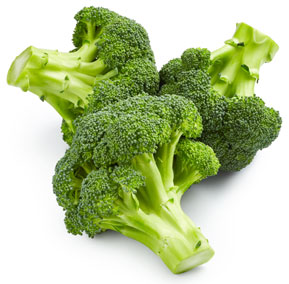





1. Broccoli Facts
2. Types of Broccoli
3. Nutritional Value of Broccoli
4. Health Benefits of Broccoli
Broccoli (Brassica oleracea var. italica) is a green vegetable from the Brassicaceae (also called Cruciferae) family. Broccoli is a form of cabbage belonging to the same family as the cabbage, cauliflower, and brussels sprouts. Broccoli is a cool weather crop which grows better with a temperature of between 18-23 deg C.
History and Origin
Broccoli was grown as "wild cabbage" along the western and northern coasts of the Mediterranean where it was domesticated thousands of years ago. As its name suggests, it was an Italian vegetable, long before it was eaten anywhere else. Broccoli has been regarded as a very important vegetable amongst Italians since the Roman Empire. It is believed to have been mentioned throughout history in France during the 16th century, however there is no mention of it in England until the mid-18th century. It was commercially cultivated in United States around 1922 by two Italian immigrant brothers.
- • Calabrese
- • Sprouting
- • Romanesco
- • Purple
Vegetables " Broccoli " ( Nutritional value )
Nutritional value per 100 g
Broccoli, cooked, boiled, drained, without salt
|
Nutrient ( Proximate's )
|
Unit
|
Value
|
Daily Value %
|
|
Energy
|
kcal
|
35
|
1.7%
|
|
Protein
|
g
|
2.38
|
4.7%
|
|
Total lipid (fat)
|
g
|
0.41
|
0.005%
|
|
Carbohydrate, by difference
|
g
|
7.18
|
2.6%
|
|
Fiber, total dietary
|
g
|
3.3
|
11.7%
|
|
Sugars, total
|
g
|
1.39
|
|
|
Minerals
|
|||
|
Calcium, Ca
|
mg
|
40
|
3%
|
|
Iron, Fe
|
mg
|
0.67
|
3.7%
|
|
Magnesium, Mg
|
mg
|
21
|
5%
|
|
Phosphorus, P
|
mg
|
67
|
5.3%
|
|
Potassium, K
|
mg
|
293
|
6.2%
|
|
Sodium, Na
|
mg
|
41
|
1.7%
|
|
Zinc, Zn
|
mg
|
0.45
|
4%
|
|
Copper, Cu
|
mg
|
0.061
|
6.7%
|
|
Manganese, Mn
|
mg
|
0.194
|
8.4%
|
|
Selenium, Se
|
mcg
|
1.6
|
2.9%
|
|
Fluoride, F
|
mcg
|
4.0
|
|
|
Vitamins
|
|||
|
Vitamin C, total ascorbic acid
|
mg
|
64.9
|
72.1%
|
|
Thiamin (B-1)
|
mg
|
0.063
|
5.2%
|
|
Riboflavin (B-2)
|
mg
|
0.123
|
9.4%
|
|
Niacin NE (niacin) (B-3)
|
mg
|
0.553
|
3.4%
|
|
Pantothenic acid (B-5)
|
mg
|
0.616
|
12.3%
|
|
Vitamin B-6
|
mg
|
0.200
|
11.7%
|
|
Folate DFE (dietary folate) (B-9)
|
mcg
|
108
|
27%
|
|
Vitamin B-12
|
mcg
|
0.00
|
|
|
Vitamin A, RAE (retinol)
|
mcg |
77
|
11.6%
|
|
Vitamin E (alpha-tocopherol)
|
mg
|
1.45
|
9.6%
|
|
Vitamin D (D2 + D3)
|
mcg |
0
|
|
|
Vitamin K (phylloquinone)
|
mcg
|
141.1
|
117.5%
|
|
Lipids
|
|||
|
Saturated Fatty Acids
|
g
|
0.079
|
|
|
Monounsaturated Fatty Acids
|
g
|
0.040
|
|
|
Polyunsaturated Fatty Acids
|
g
|
0.170
|
|
|
Trans Fatty Acids
|
g
|
0.000
|
|
|
Carotenoids
|
|||
|
Beta-Carotene
|
mcg |
929
|
|
|
Lutein + zeaxanthin
|
mcg
|
1080
|
|
|
Lycopene
|
mcg
|
0
|
|

|
Reference Values are based on a 2,000 Calorie Intake, for Adults and Children 4 or More Years of Age. Your daily values may be higher or lower depending on your calorie needs.
|
|
Percentages are roughly approximated using (RDA) Recommended Dietary Allowances for adults. Source: USDA United States Department of Agriculture
|
|
Reference Values for Nutrition - FDA U.S. Food and Drug Administration
|
Broccoli Nutritional Value
Broccoli is a very nutritious vegetable being high in vitamin C, vitamin K, vitamin A, riboflavin, calcium, iron, and soluble fiber.
Broccoli is a very nutritious vegetable being high in vitamin C, vitamin K, vitamin A, riboflavin, calcium, iron, and soluble fiber.
The compound sulforaphane has been identified in broccoli, which, of the cruciferous vegetables, has the highest concentration of sulforaphane. This compound is best known for its anti-cancer benefits. Boiling broccoli significantly reduces the level of sulforaphane from 20-30% after 5 minutes to 77% after 30 minutes. However, steaming, microwaving, and stir-frying has no significant effect.
Many research studies have determined that cancer is related to three metabolic problems within the body. These three problems are (1) chronic inflammation (2) oxidative stress, and (3) inadequate detoxification. It is believed that broccoli can assist all three of these problems as it is rich in anti-inflammatory nutrients, antioxidant nutrients, detox-support nutrients, and anti-cancer nutrients.
Because of broccoli's rich source of the phytonutrient kaempferol, it can help lower the risk of chronic inflammation. Broccoli has a strong, positive impact on our body's detoxification system due to three glucosinolate phytonutrients found in the vegetable. Antioxidants in broccoli lower risk of oxidative stress in the body, such as muscle and tissue damage, diabetes, and heart disease.
Of all the common cruciferous vegetables, broccoli has the most concentrated source of vitamin C, helping immune system deficiencies. The dietary fiber in broccoli helps prevent bacterial overgrowth to the stomach wall and regulates the speed and consistency that food travels through our intestines.
Lutein and zeaxanthin, two carotenoids, found to be in significant concentration in broccoli, play a vital role in eye health. B-complex vitamin deficiency poses a risk for cardiovascular health such as stroke and heart attacks. Broccoli is a rich source of B-complex vitamins, namely B6 and folate. It also has a cholesterol lowering ability which supports cardiovascular health.
Whilst broccoli does not have any Vitamin D, it is an excellent source of Vitamin K and Vitamin A. Research indicates that when Vitamin D supplements are required to offset a deficiency, sufficient sources of Vitamin K and Vitamin A together (in broccoli), can keep the Vitamin D metabolism in proper balance.
- MACULAR DEGENERATION
Significant amounts of the lutein and zeaxanthin carotenonids. - ANTI-CANCER BENEFITS
Has the highest concentration of sulforaphane - CHRONIC INFLAMMATION
Rich source of the phytonutrient kaempferol - CARDIOVASCULAR HEALTH
Rich source of folate and vitamin B6 - DETOXIFICATION
Glucosinolate phytonutrients found in broccoli

- CATARACTS (eye health)
Significant amounts of the lutein and zeaxanthin carotenonids. - DIGESTIVE SYSTEM
Dietary fiber content - IMMUNE SYSTEM DEFICIENCIES
Rich source of vitamin C - VITAMIN D METABOLISM BALANCE
Sufficient sources of vitamins K & A together - OXIDATIVE STRESS IN THE BODY
High concentration of antioxidants
References
|
Nutrient Database - USDA (United States Department of Agriculture)
|
|
Reference Values for Nutrition - FDA U.S. Food and Drug Administration
|
